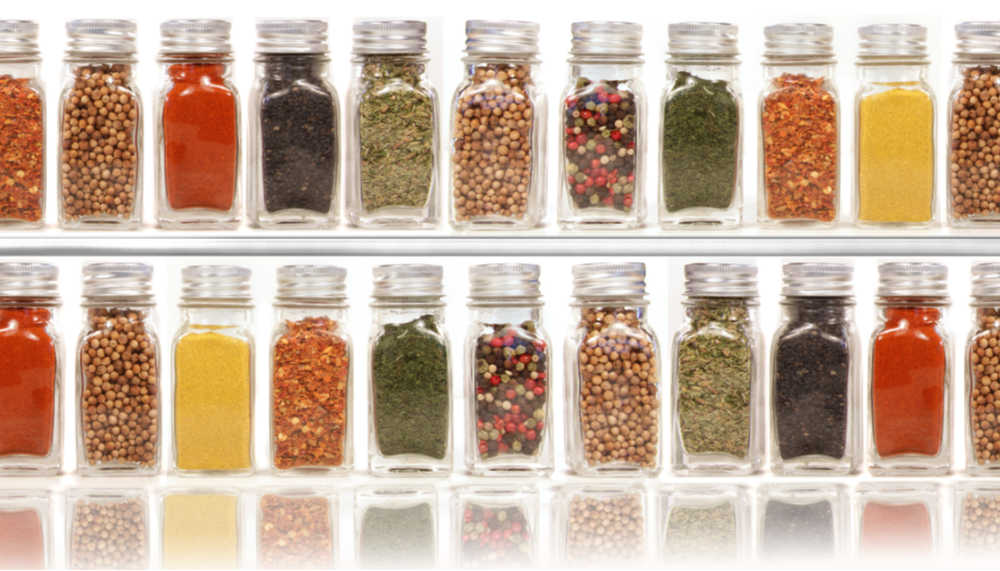One of the most crucial factors to take into account when determining whether or not to let your dog eat food from the table or prepare food for them in general is their health and safety. After all, various spices can have an impact on your dog friend, ranging from mild toxicity to severe irritation. In light of this, it’s crucial to understand which spices can be toxic to dogs.
When cooking for your dog, certain spices should be completely avoided. Strong-flavored herbs, such as black pepper and garlic, can, for instance, aggravate your dog’s digestive system and lead to serious health issues if consumed frequently or in large quantities.
Furthermore, it’s crucial to use caution when using certain spices in recipes because some of them, like nutmeg, can actually be toxic for dogs. The bottom line is that when preparing meals for your dog, you must carefully consider the ingredients you use.
Dogs and Spices: What You Need To Know

Can dogs eat spices? It might be tempting to make an extra serving of dinner and give it to your dog.
This is a thorough list of spices that can and cannot be consumed by dogs, including those that are safe but you should exercise caution when using them.
Always keep in mind that giving your pet large amounts of anything is not a good idea. Using a few of the safe spices on your dog’s food is acceptable, but you should exercise caution nonetheless. Dogs don’t require highly spiced foods (like we do on our human food) because they have fewer taste buds than humans.
If you think your dog ingested unsafe or toxic spices, call the pet poison helpline at 855-764-79661 or your local veterinarian. And please, if you have questions about whether an essential oil is safe or if herbs have health benefits for your dog, ask your veterinarian.
This list is for you if you’ve ever wondered, “What spices can dogs eat?” Many spices can be either completely toxic for dogs or completely safe for humans.
Let’s start by going over all the spices that are completely safe for your dog, along with some tips for using them.

According to the ASPCA, cinnamon powder is non-toxic for dogs. Especially in the fall, this is a great spice to add to homemade dog biscuits.
Dogs can safely eat ceylon cinnamon without side effects. In fact, it can lower blood pressure, lowering your dog’s risk of developing heart issues. The anti-inflammatory properties can help decrease joint pain too.
Be aware that many ingredients that are frequently combined with cinnamon in dog treat recipes are actually very bad for your dog. Avoid giving your dog nutmeg, chocolate, raisins, or macadamia nuts.
Yes, dried and ground coriander is safe for dogs. Another name for it is cilantro. It can help calm stomach upset.
Read more about dogs and cilantro.
Yes, can dogs eat ginger. Some holistic veterinarians treat puppies’ upset stomachs with ground ginger. See this article about dogs and ginger for more details.
This easy-to-follow recipe for apple-ginger dog treats is very popular with puppies.
Small doses of saffron are typically safe for your dog to consume. Of course, if your dog consumed the entire jar of saffron, their stomach might become upset.
Give your dog a small amount of saffron at first because some dogs may not respond well to it.

Humans have utilized turmeric for its antioxidant and anti-inflammatory properties. It is known to be safe for dogs to eat, but there haven’t been many studies to determine whether it’s equally beneficial for dogs.
In fact, some dog foods list turmeric as an ingredient. It is a fairly typical additive that makes the food taste better and gives it a more natural color.
These spices are ok for dogs. You can give your dogs the spices on this list, but you should only give them a tiny bit at a time.
Anise is the flavor most off associated with licorice. In fact, the artificial hare used in greyhound racing is doused in anise oil, so you know how dogs will react to it if you’ve ever seen a cat go crazy over catnip.
Anise is safe for dogs in small doses. Overeating can upset your dog’s stomach or cause their nervous system to become depressed.
Use a tiny bit of anise in a homemade dog treat as this is the safest way to give it to your dog.
Yes, dogs can safely eat ground cardamom in moderation. Due to its anti-inflammatory properties, some pet parents use it holistically as an energy booster and a treatment for ringwork.
Be aware that dogs may experience laxative effects from too much cardamom.
Cayenne pepper is safe for dogs to eat, but they won’t want to touch it. For a dog, it is extremely irritating to the skin, eyes, and nose. Keep it away from your dog even though it’s safe for dogs.
In small amounts, cumin is completely safe for dogs. Be careful with how much you use, however. It might cause your dog’s stomach to upset or give them painful gas in large doses.
Cumin may provide older dogs with energy or a boost to their immune systems in small doses.
Give your dog a small amount to taste before you start adding it to their food, and watch how they react.
Yes, dogs can heat dried oregano. Due to its antifungal and antibacterial qualities, it benefits your dog’s immune system. Additionally, it might benefit senior dogs by lowering their risk of osteoarthritis.
Be aware that giving your dog too much dried oregano can cause gastric irritation.
These are the spices dogs should not eat. Read this list carefully, keep these spices out of your dog’s food, and forbid your dog from consuming human food containing any of these.
Within this list are spices that are poisonous for dogs.
The dried berries of the Pimeta dioica plant, a member of the myrtle family, are used to make allspice. All types of myrtle are toxic to dogs. Eugenol, which is present in the dried berries and ground allspice, can be toxic to dogs’ livers.

Bay leaves are toxic for dogs. They have eugenol and other toxic essential oils in them.
Your dog may experience some of the following signs after eating a bay leaf:
This leaf’s jagged edges could hurt the GI tract.
Dogs lack the same enzymes that humans do that allow them to metabolize some essential oils and eugenol. Contact your veterinarian right away if you suspect your dog consumed a bay leaf.
No, dogs cannot eat chili powder. Due to their sensitivity to spicy foods, dogs may experience serious stomach upset if they consume chili powder.
Chili powder is not exactly toxic for dogs. They may only begin to sneeze frequently and experience stomach discomfort if they unintentionally consume something that was spiced with chili powder. Give them plenty of water and watch for worse symptoms.
Cloves contain eugenol, which a dog’s body cannot digest, similar to bay leaves. For this reason, cloves are considered toxic to dogs. It can cause serious liver problems.
Some sources assert that cloves may not be particularly harmful to dogs. However, I advise staying away from it entirely and consulting your veterinarian before giving it to your dog because there is still a chance it could hurt them.
Dogs should not eat cocoa powder. It has a theobromine content of up to 26 mg per gram, which is extremely toxic to dogs.
Caffeine, which is also found in cocoa powder, significantly raises a dog’s heart rate and stimulates their nervous system.
Another strong spice that dogs cannot digest is curry. In the same way that too much curry can result in diarrhea and other issues like an upset stomach
Give your dog plenty of water and keep an eye out for any health issues like lethargy and vomiting if they consume your curry.
What Happens If My Dog Eats Chili Powder?

Do you allow your dog to consume hot sauce or cayenne pepper? The answer is categorically no. Feeding spicy foods to pets may result in more issues than you realize. When dogs eat spicy foods, they may experience diarrhea and gas.
In general, dogs are not bred to taste differently than humans. Dogs prefer to avoid chilies because they smell better than they taste. There is no harm in eating a small amount of their food. Chili powder isn’t something that they’d try on their own. If your dog consumes a lot of chili, he may become ill. Capsaicin, a compound found in chili, can cause hypertension in dogs. Your dog’s heart rate may rise significantly after consuming chili. If you’re going to give your dog chili, you might as well try something sweet like sweet bell peppers. They are simple to digest on the palate and stomach.
Give your dog plenty of water and watch him closely to see if he becomes upset if he eats something hot. You should speak with a veterinarian as soon as possible if the symptoms don’t go away. Take the necessary precautions and get ready in advance to help your dog recover when he has a spicy incident. Dogs are in grave danger when they come in contact with hot sauce. Consult your veterinarian if any of your dog’s symptoms don’t go away. If you feed your dog properly and keep an eye out for any warning signs, you can assist them in recovering quickly and safely.
Can Dogs Eat Chili Without Beans
It is not advisable to feed the dog baked beans, chili beans, coffee beans, or raw red kidney beans because they are all high in caffeine, which is poisonous, and tomatoes, garlic, and onions, which are also high in sugar.
There are numerous myths about dog diets and how they should be consumed. Can dogs eat tomato without beans? Is chocolate bad for dogs? Can cows eat garlic? However, dogs should not consume more than a certain amount of chili because some ingredients in the dish can be harmful. Chili peppers, meat, and other spices are commonly used in this dish. It is high in protein and fiber, which dogs require for proper health. If you give your dog too much chili with beans, he may become ill.
FAQ
What happens if my dog eats chili powder?
Dogs may be poisoned by chili powder, which can also upset their stomachs and cause vomiting and diarrhea. Bring your dog to the veterinarian right away if they exhibit any of these symptoms. If consumed, spicy foods can cause stomach issues and be harmful to dogs.
Which spices are toxic to dogs?
- Onion.
- Garlic.
- Salt.
- Cocoa Powder.
- Nutmeg.
Will chilli powder deter dogs?
Common kitchen spice chili powder can be used to prevent dogs from digging. Applying chili powder to dog digging spots will irritate their noses and make them less likely to go back there.
Is chili pepper toxic to dogs?
However, you should never feed your dog a spicy pepper. Spicy peppers, also known as chilis or chili peppers, contain capsaicin, the compound that gives hot peppers their heat while also being non-toxic. Although it is not a toxic substance, it can cause your pet great pain and discomfort.